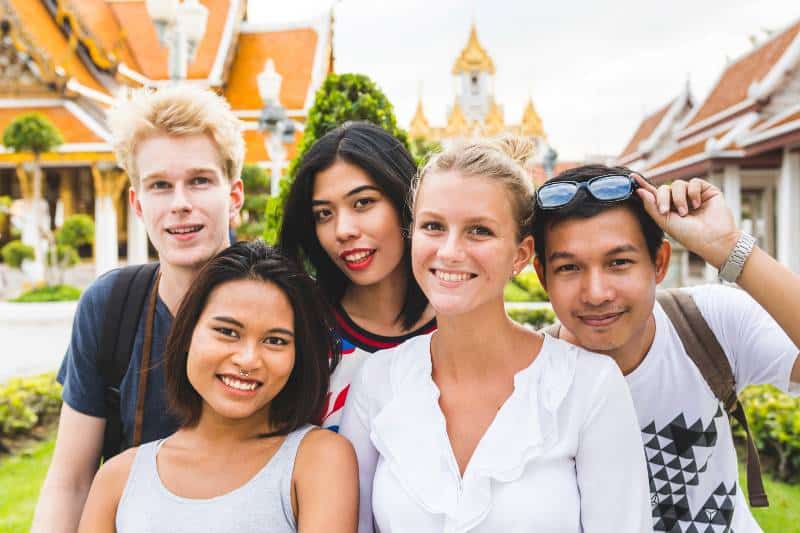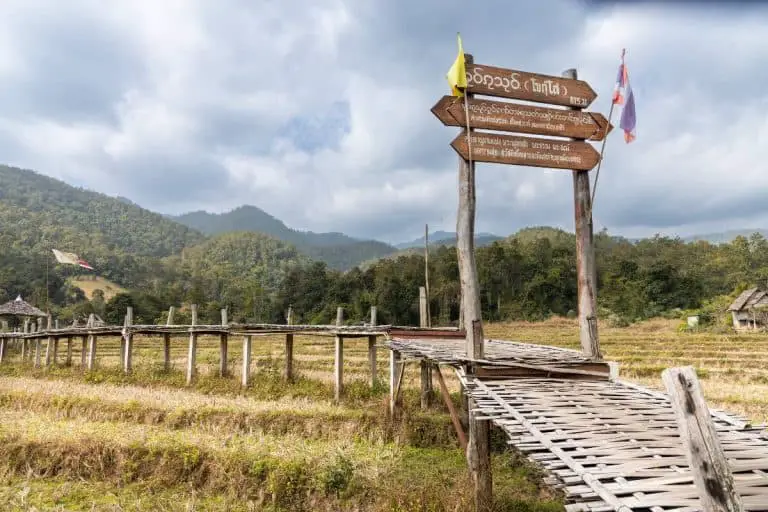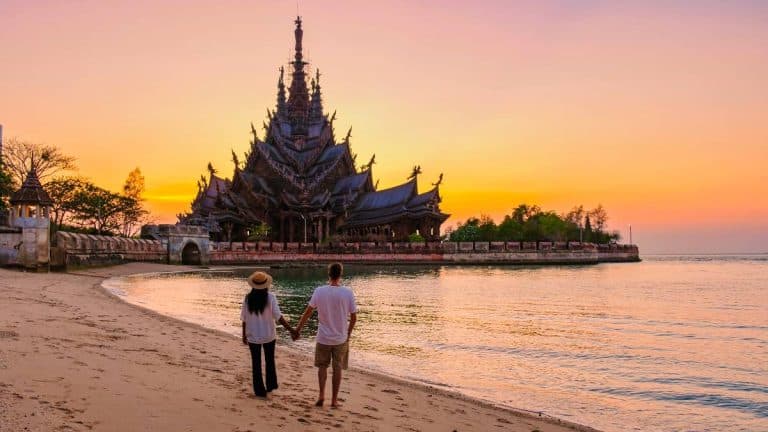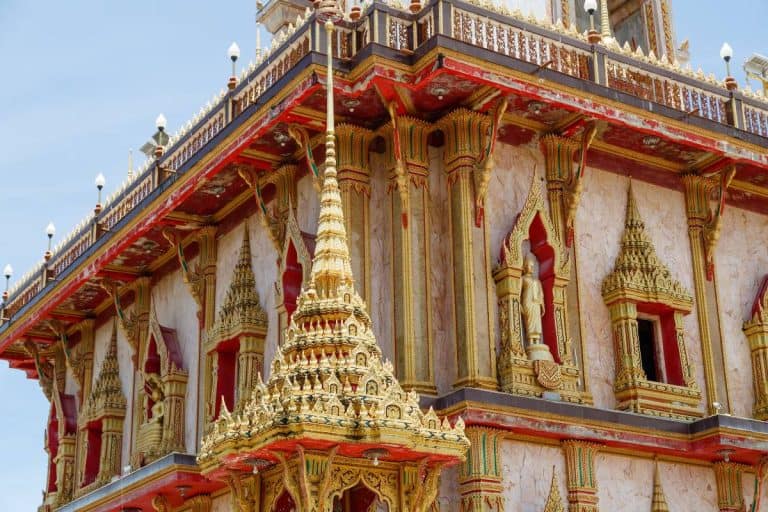Uncovering the Expat Communities in Thailand
Are you considering living and working abroad in Thailand? The expat lifestyle in the Land of Smiles has been gaining popularity as more and more people choose to reside outside their country of origin. With its unique culture, amazing cuisine, stunning landscapes, and friendly locals, it’s no wonder that Thailand has become a hotspot for expatriates from all over the world. But what does life look like when living as part of an expat community in Thailand?
In this blog post, we’ll be exploring some of the most popular areas for foreign residents; grilling up cultures and cuisines; discovering travel opportunities available to those based around the country; uncovering why so many have opted for an extended stay in Thailand; plus advice on how best to fit into your new local scene! So if you are ready to explore all that life among fellow expats can offer—buckle up, because things are about to get interesting!
Thailand’s diverse expat communities, located in areas like Bangkok, Chiang Mai, Phuket, Hua Hin, and Pattaya, are composed of professionals, retirees, and digital nomads. Attracted by the country’s affordability, quality healthcare, and cultural richness, expats enjoy varied lifestyles, from urban buzz to relaxed beach living, while navigating cultural differences, language barriers, and legalities.
Key Takeaways
- Thailand has emerged as a popular destination for expats due to its affordable cost of living, appealing lifestyle, and welcoming local communities.
- The main expatriate communities in Thailand are located in Bangkok, Chiang Mai, Phuket, Hua Hin, and Pattaya, each offering unique experiences and lifestyles.
- While moving to Thailand offers many benefits, expats also face challenges such as language barriers, cultural adaptation, and legal aspects that need careful consideration.
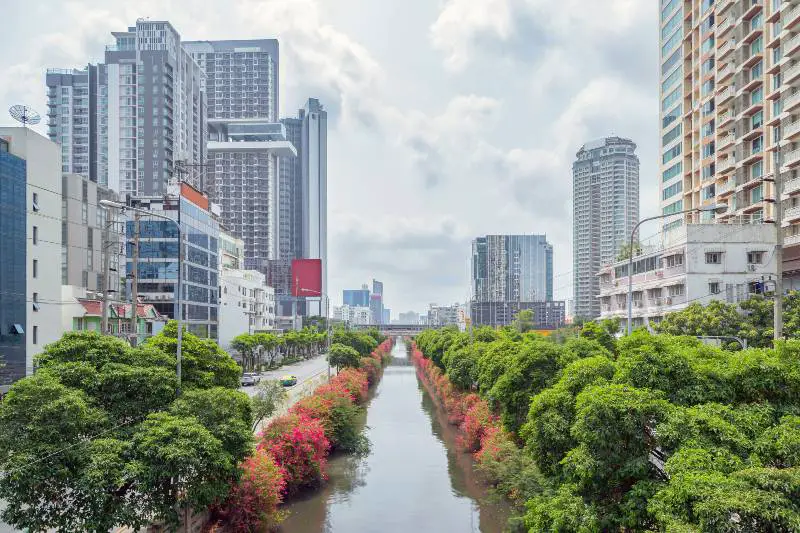
Understanding Expatriate Communities
Expatriate communities are groups of people who reside outside their native country, either on a temporary or permanent basis. These communities are often formed based on a shared sense of nationality, culture, or language among individuals living abroad. The term “expatriate” or “expat” usually refers to skilled workers, professionals, or retirees who have chosen to live in a foreign country for lifestyle, work, or retirement reasons.
The demographics of expatriate communities can vary greatly depending on the host country, the industry in which they work, and individual personal circumstances. For instance, you might find a young, highly educated demographic in expat communities in tech-heavy cities like San Francisco, Bangalore, or Berlin.
On the other hand, expat communities in places like southern Spain or Mexico might be primarily composed of retirees seeking a warm climate and a more relaxed pace of life. Furthermore, some expat communities are quite diverse, comprising multiple nationalities, while others are mainly composed of individuals from a particular country, reflecting historical, linguistic, or economic ties.
Being part of an expatriate community can offer a variety of benefits, particularly in terms of providing support and easing the transition to a new and potentially very different culture and environment. For instance, more seasoned members of the community can provide practical advice on navigating local bureaucracy, finding accommodation, or identifying the best local schools. This type of support can be invaluable in helping new arrivals settle in and feel at home more quickly.
Socially, expatriate communities can provide a familiar cultural context, easing feelings of homesickness or cultural disorientation. They often organize social events, cultural celebrations, and sports activities, creating opportunities to make new friends and maintain traditions from home. For instance, an American expat community might host a big Thanksgiving dinner, or a British expat group might arrange a cricket match.
Professionally, these communities often function as networks, fostering connections that can lead to job opportunities or collaborations. Expats working in similar industries can share knowledge and insights, discuss common challenges, or provide introductions to useful contacts. For example, an expat working in the finance sector in Hong Kong might connect with fellow finance professionals from their home country, facilitating a more profound understanding of the local business environment while also maintaining ties with their home market.
In terms of personal development, living in an expatriate community can offer unique opportunities for cultural exchange and learning. Immersing oneself in a different culture, learning a new language, or adapting to new ways of working can significantly broaden one’s horizons and develop resilience and adaptability – skills highly valued in today’s increasingly globalized world.
Nevertheless, while expatriate communities offer considerable benefits, it’s also worth noting the importance of integrating with the wider local community in order to fully appreciate and respect the host country’s culture, establish meaningful relationships, and enhance one’s overall experience living abroad.
Top Expatriate Communities in Thailand
1. Bangkok
Bangkok, the vibrant and cosmopolitan capital of Thailand, is home to a vast expatriate community, which is as diverse as the bustling city itself. This community comprises professionals working in sectors such as finance, technology, and education, among others. It also includes retirees attracted by the city’s high-quality healthcare facilities and a myriad of lifestyle options.
Bangkok offers an exciting expat life, with a plethora of shopping centers, international restaurants, bustling night markets, and vibrant nightlife. Its vast expat community provides ample opportunities for socializing, with numerous clubs, groups, and activities catering to a wide array of interests.
In terms of cost of living, Bangkok is relatively affordable compared to many Western cities. However, it is considered one of the more expensive locations in Thailand, with costs for things like accommodation and international schooling being particularly high. For instance, a one-bedroom apartment in the city life center may cost around 20,000 – 30,000 Thai Baht per month (as of my knowledge cutoff in September 2021).
2. Chiang Mai
Chiang Mai, located in the mountainous region of Northern Thailand, has a significant expat community, made up of retirees, digital nomads, and educators. The expats are attracted by the city’s slower pace, cultural richness, cooler climate, and reputation as a hub for digital nomads.
Chiang Mai offers a quieter, more relaxed lifestyle compared to Bangkok. With its temples, historic sites, traditional markets, and close proximity to the mountains, it provides plenty of opportunities for cultural immersion and outdoor activities.
The cost of living in Chiang Mai is lower than in Bangkok. A decent one-bedroom apartment in the city center might cost around 10,000 – 15,000 Thai Baht per month. Additionally, local food and transportation are also quite affordable.
3. Phuket
Phuket, Thailand’s largest island, has a substantial expat community, predominantly composed of retirees, hospitality professionals, and people running their own businesses, particularly in tourism and real estate.
The lifestyle in Phuket is centered around its beautiful beaches, with opportunities for water sports, boating, and diving. The island also offers a variety of dining options, from local seafood to high-end international cuisine, and has an active nightlife scene.
Phuket’s cost of living is relatively high by Thai standards, driven in part by its status as a tourist hotspot. As an example, rent for a one-bedroom apartment in the city center could be around 15,000 – 20,000 Thai Baht per month.
4. Hua Hin
Hua Hin, a resort town on the Gulf of Thailand, has an expat community primarily consisting of retirees from various countries. Its popularity among many expats is attributed to its beautiful beaches, golf courses, and quiet, relaxed atmosphere.
The convenient lifestyle in Hua Hin is largely laid-back, with a focus on beach activities, golfing, and dining in its variety of restaurants serving both Thai and international cuisines. Hua Hin also has night markets offering a range of goods, from food to clothing.
The cost of living in Hua Hin is moderate. You might expect to pay around 10,000 – 20,000 Thai Baht per month for a one-bedroom apartment in the city center.
5. Pattaya
Pattaya, another beach lifestyle, resort city on the Gulf of Thailand, has a sizeable expat community, largely made up of retirees, along with those in the hospitality and tourism industries.
The lifestyle in Pattaya is quite varied. Alongside its beaches and water sports, it offers golf courses, international restaurants, shopping malls, and a notorious nightlife. The city is also known for its active social scene, with a variety of clubs and societies aimed at ex-pats.
The cost of living in Pattaya is relatively affordable, with a one-bedroom apartment in the city center possibly costing between 10,000 – 15,000 Thai Baht per month.
Please note that these costs are estimates and could vary depending on personal lifestyle choices and the specific area within each city.
5. Krabi
Krabi, a charming province on the southern coast of Thailand, is renowned for its stunning natural beauty which includes lush jungle-covered cliffs, pristine white sandy beaches, and mesmerizing turquoise waters. The views of Krabi’s shores and its nearby islands are the kinds that inspire films, and they’ve appeared in plenty as well. The area also boasts a lively expat community, with many individuals hailing from Western countries who are drawn to its peaceful, laid-back lifestyle and an authentic blend of Thai life culture and modern conveniences.
Krabi’s cost of living remains one of its biggest draws for expats. Rent for a modern, one-bedroom apartment in the town center averages around 10,000 to 15,000 Thai Baht ($300 to $450) per month while living outside the city center can be even cheaper. Eating out is also affordable, with meals at local Thai restaurants often costing less than $2.
Utilities and internet service are also reasonable in cost. Groceries might be slightly more expensive compared to other parts of Thailand, primarily due to the region’s relative remoteness and the availability of Western goods.
Despite the cost of healthcare being higher than in many Western countries, it remains cheaper than in the United States, and the quality is generally good. Expats often opt for health insurance to cover any medical needs.
Culture and Lifestyle
Thai Culture, Language, and Customs:
Thai culture is deeply influenced by Buddhism, which is evident in everything from architecture to daily routines. Respect for elders and people of higher social status is deeply ingrained in Thai society, as is a general aversion to confrontation and public displays of anger or irritation, a concept known as “saving face.”
One of the first things you might notice about Thai culture is the “wai,” a traditional form of greeting involving a slight bow with palms pressed together in a prayer-like gesture. It signifies respect and is used widely in various social contexts.
The Thai language, or Siamese, is the national language of Thailand. It can be complex for newcomers due to its tonal nature, meaning that a word’s meaning can change depending on the tone in which it’s spoken. However, English is widely spoken in major cities and tourist areas, making it relatively easy for expats to communicate.
Thai customs also emphasize modesty, particularly in dress. While more Western-style attire is commonly seen in cities and tourist areas, when visiting temples or other religious sites, both men and women are expected to dress modestly, covering their shoulders and knees.
Lifestyle and Living Conditions:
The lifestyle and living conditions in Thailand can vary significantly depending on the area. Major cities like Bangkok offer a fast-paced urban lifestyle with high-rise apartments, international cuisine, bustling local markets, and vibrant nightlife. However, they also come with challenges such as traffic congestion and air pollution.
In contrast, the northern city of Chiang Mai offers a more relaxed pace of life with an emphasis on outdoor activities and cultural exploration. Coastal towns like Phuket and Hua Hin provide a resort-like atmosphere, centered around beach activities and water sports.
Thailand’s infrastructure is generally good, particularly in urban areas, where healthcare facilities are excellent, and public transportation is efficient and inexpensive. Internet connectivity is reliable and widespread, making it a popular destination for digital nomads.
Interactions Between Locals and Expats:
Interactions between locals and expats in Thailand are generally positive, aided by the Thai people’s reputation for friendliness and hospitality, which has given Thailand its nickname, “The Land of Smiles.” Many Thais are accustomed to foreigners due to the country’s thriving tourism industry and generally have a favorable view of expats who respect local customs and traditions.
However, like in any country, the depth and quality of these interactions depend on the willingness of expats to integrate into local society. Those who make an effort to learn the language, understand the culture, and participate in community activities will likely find their interactions with locals more rewarding and their overall experience in the country more enriching.
That being said, expats should also be aware of the cultural nuances and social norms to avoid misunderstandings. For instance, the Thai royal family is deeply revered, and any perceived disrespect is not only a cultural faux pas but can also carry legal consequences.
Practical Aspects
Cost of Living Comparison:
The cost of living in Thailand is typically lower than in many Western countries, which is one of the factors contributing to its popularity among expats. However, costs can vary significantly depending on the location and lifestyle. For example, the cost of living in major cities like Bangkok and touristy areas like Phuket tends to be higher than in more rural or less touristy areas.
Accommodation costs can range from around 10,000 Thai Baht per month for a one-bedroom apartment in a smaller city like Chiang Mai to 30,000 Thai Baht or more for a similar apartment in central Bangkok. Food costs also vary, but street food and local restaurants are generally very affordable. International cuisine tends to be more expensive.
Utilities, transportation, and healthcare are also generally cheaper than in Western countries, while costs for things like imported goods, international schools, and leisure activities like golf or boating can be comparable to prices in the West.
Healthcare and Education Facilities:
Thailand is renowned for its high-quality healthcare, particularly in the larger cities. Both public and private hospitals provide excellent care, with many doctors and medical staff speaking English. Thailand has become a significant medical tourism destination due to the quality and affordability of its healthcare services. However, it’s crucial for expats to have comprehensive health insurance, as costs can be high for significant medical procedures.
Thailand also has a range of education options for expat families. International schools, mainly found in larger cities, offer various curricula including American, British, and the International Baccalaureate. However, fees for these schools can be quite high, so it’s essential to factor this into your budget if you have school-aged children.
Legalities (Visa, Work Permit):
Foreigners planning to stay long-term in Thailand will need to secure a proper visa. There are several types, including retirement visas (for those over 50 years old who meet financial requirements), education visas (for those studying in Thailand), and business visas (for those working or investing in Thailand).
To legally work in Thailand, expats must have a work permit, typically obtained through their employer. The process can be bureaucratic, requiring various documents including a non-immigrant visa, a letter of employment, and sometimes a health certificate. It’s essential to ensure that you have the correct visa and work permit to avoid legal complications.
It’s also worth noting that Thai property laws have some restrictions. Foreigners cannot directly own freehold land in their name but they can own buildings, condominiums, and leasehold properties. It’s crucial to seek appropriate legal advice if you’re planning to buy property in Thailand.
Make sure to take some time and read this article I wrote about the Thailand Elite Visa Program [Pros & Cons]. As an expat in this beautiful country, I delve into the various advantages and disadvantages of the program, providing valuable insights that will help you make an informed decision. So, grab a cup of coffee and indulge in this comprehensive read that sheds light on navigating Thailand’s visa options as an expatriate.
Challenges and Adaptation
Common Challenges Faced by Expats:
- Language Barrier: While English is commonly spoken in tourist areas and by professionals in major cities, it’s less prevalent in rural areas and among older generations. This can lead to misunderstandings or difficulties in day-to-day situations like shopping or asking for directions.
- Cultural Differences: Thai culture can be quite different from Western norms. Concepts like “saving face” can be challenging to understand, and actions seen as disrespectful, such as touching someone’s head or pointing your feet at someone, can unintentionally cause offense.
- Climate: Thailand’s tropical climate, characterized by high temperatures and humidity, can take some getting used to, particularly for those from cooler climates. The country also has a rainy season that can bring intense storms and occasional flooding.
- Navigating Legalities: Understanding and navigating Thai legalities, such as visa regulations or restrictions on foreign property ownership, can be challenging and requires careful attention.
Tips for Adapting to the Thai Lifestyle:
- Learn the Language: Even a basic understanding of Thai can make a big difference in your day-to-day life and can also open up opportunities for deeper cultural understanding and connection with locals.
- Understand and Respect the Culture: Familiarize yourself with Thai customs, social norms, and traditions. Show respect for the local culture, whether that’s by returning a “wai” or dressing modestly when visiting temples.
- Engage with the Community: Whether it’s through sports clubs, social groups, volunteering, or neighborhood events, getting involved in your local community can be a great way to meet people, understand the culture, and feel more at home.
- Stay Open and Flexible: Adaptability is key when living in a new country. Things might not always work the way you’re used to, and that’s okay. Being open to new experiences and ways of doing things can make your time in Thailand more enjoyable and rewarding.
- Seek Legal Advice: As an expat, it’s crucial to understand the laws and regulations that apply to you. Consult with legal professionals, particularly regarding visas, work permits, or if you’re considering buying property.
Remember, moving to a new country is a significant life event, and it’s natural to face some challenges along the way. The key is to view these challenges as opportunities for learning and growth and remember that with time, things will become more familiar and manageable.
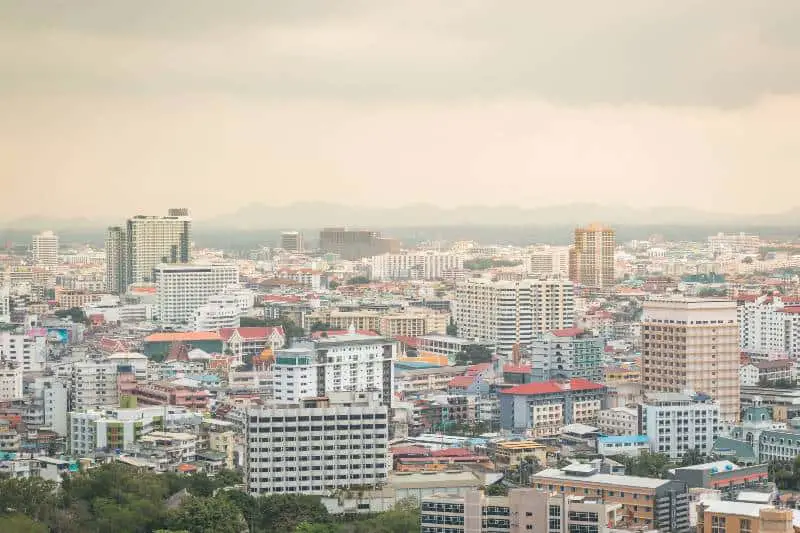
Expatriate Communities in Thailand FAQs
What is the cost of living in Thailand for expats?
The cost of living in Thailand for expats varies depending on where they live and the lifestyle they choose. Generally, it’s cheaper than in Western countries — rent tends to be lower, particularly when compared to bigger cities like Bangkok, while food and utilities can also be quite affordable. However, some imported goods and international schools may be more expensive than back home.
How are healthcare and education facilities for expats in Thailand?
Thailand is renowned for its high-quality healthcare, particularly in the larger cities. Both public and private hospitals provide excellent care, with many doctors and medical staff speaking English. There are also a range of international schools offering various curricula, though fees may be quite high.
What legalities should expats consider when moving to Thailand?
Foreigners planning to stay in Thailand long-term will need to secure the appropriate visa and work permit. It’s essential to ensure that you have the correct documents, as legal complications can arise otherwise. Additionally, it’s important for expats to understand Thai property laws — foreigners are not allowed to own freehold land but they can own buildings, condominiums, and leasehold properties.
What are the legal requirements for becoming an expat in Thailand?
The legal requirements for becoming an expat in Thailand depend on the type of visa and work permit you need. Generally, applying for a non-immigrant visa requires documents such as a passport photo, bank statement, health certificate, and a letter of employment from your employer. The process can be bureaucratic and obtaining the correct legal documents is essential to avoid any potential issues.
How can one integrate into the local community in Thailand as an expat?
Integrating into the local community as an ex-pat in Thailand is all about getting involved. Whether that’s through sports clubs, social groups, volunteering, or neighborhood events, engaging with locals can be a great way to make friends and feel more at home. Additionally, learning some of the languages can help you to understand the culture better and build deeper connections with people.
Are there language barriers for expats in Thailand?
English is commonly spoken in tourist areas and by professionals in major cities, but it’s less prevalent in rural areas and among older generations. This can lead to misunderstandings or difficulties in day-to-day situations like shopping or asking for directions. Therefore, learning the language and brushing up on common phrases can be very helpful when living in Thailand as an expat.
Conclusion
It is clear that Thailand is an attractive option for expats, offering a low cost of living, an appealing lifestyle, and friendly local communities. Whether expats wish to live in the hustle-bustle of Bangkok or immerse themselves in the laid-back atmosphere of a beach town like Phuket, there will be something for everyone. However, when making the decision to move to Thailand there are several important factors to consider including language barriers, cultural adaptation, and legal aspects. Thus it is essential for expatriates to research carefully and thoroughly prepare before taking that big step.
For more information on living in Thailand, we invite you to subscribe to our newsletter or reach out directly to us with any questions. With support from people who understand what it’s like starting a new life abroad, you’ll be well on your way toward beginning your expat journey in Thailand!
